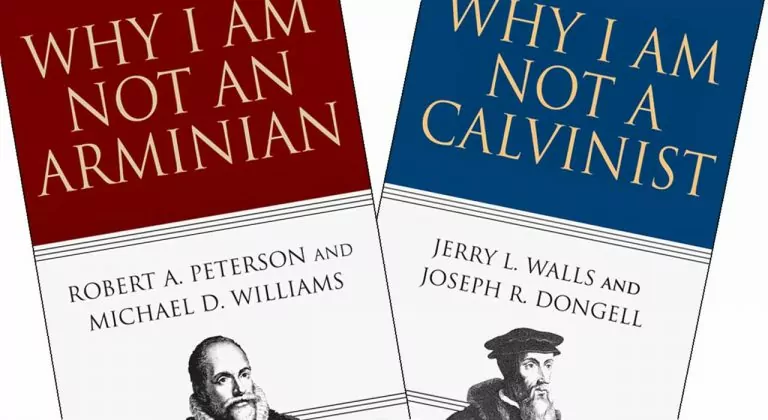Why revisit the debate between Arminianism and Calvinism? Isn’t it a waste of precious time to discuss these differences even as the world is aflame with political unrest?
No, this is a debate that should always generate interest and discussion. Dr. J. I. Packer once observed that the very terms Calvinism and Arminianism represent opposition:
“The words are defined in terms of the antithesis, and the point is pressed that no Christian can avoid being on one side or the other.”
Arminianism had considerable influence in Anglo-American theological developments and, on the surface, Calvinism might seem to have lost the battle in the theatre of American evangelicalism. Many evangelicals even believe that Calvinism is “irrelevant.” They say, “Christianity cannot possibly teach that.”
With a commitment to egalitarianism and the rejection of the traditional doctrine of original sin, American culture is receptive to Arminianism. The Arminian emphasis on individualism and self-determination dominated much of 20th century American evangelicalism. Billy Graham, for instance, uses the language of Arminianism in his crusades when he asks attendees to “make a decision for Christ” – language that Calvinists find utterly foreign to their understanding of salvation.
Revival of Calvinism
So it seems clear that Calvinism does not fit the American ideal. Why would anyone be a Calvinist then? The reason is quite simple. The gospel of Jesus Christ is countercultural.
Perhaps this is why Calvinism seems to appeal to young people, especially college students. There is also a renewed interest in Calvinism among the Southern Baptists, the largest Protestant denomination in the United States.
What is at stake?
But why should we know the differences between Calvinism and Arminianism?
Because they represent stark opposing theological visions, at the heart of which are profoundly different views of God. Two books, published as a set of sorts, highlight just how profound the differences are: What I am not a Calvinist, by Jerry Walls and Joseph Dongell, and Why I am not an Arminian by Robert Peterson and Michael Williams.
The authors of Why I am not a Calvinist believe:
“…the heart of the matter is how we understand the character of God. The issue is not how powerful God is but what it means to say he is perfectly loving and good…..The breathtaking vision of God’s Trinitarian love is obscured by the Calvinist claim that God passes over persons he could just as easily save and thereby consigns them to eternal misery.”
The following questions then, are at issue:
- How are we saved from our sins and granted eternal life?
- Are human beings so fallen that they must be saved exclusively through the unilateral and unconditional actions of God?
- Is it possible for human beings to successfully resist the saving approaches of God’s grace?
- Can any who were once truly redeemed through faith in Christ fail to receive final salvation?
The tone of the debate
Considering the seriousness of the differences, it shouldn’t come as a surprise that the history of the debate between Calvinism and Arminianism has been one of intense and often “mean-spirited” confrontation.
However, Why I am not an Arminian‘s authors aims to treat their Arminian brothers and sisters in Christ as they would want to be treated. They also note that the Synod of Dordt was right to condemn the Arminian misrepresentation of the saving ways of God. “Yet we do not think of Arminianism as a heresy or Arminian Christians as unregenerate.” They observe that Calvinists and Arminians are brothers in Christ. In other words:
“The issue of the debate is not between belief and unbelief but rather which of two Christian perspectives better represents the biblical portrayal of the divine-human relationship in salvation and the contribution of both God and man in human history.”
And Why I am not a Calvinist authors rightly say,
“We should all speak with a measure of care and reserve when delivering our interpretative conclusions.”
Why I am not a Calvinist
So what type of argument do the authors Why I am not a Calvinist make?
They first provide some background. Arminianism has its roots in the work of Jacob Arminius (1560-1609). It teaches that salvation is available to anybody who exercises faith; it contrasts with the Calvinist understanding that God alone determines who is and who is not among the elect. Arminian popular belief tends toward the overestimation of human ability and the human redemptive contribution.
Traditional Arminianism believes that the death of Christ provides grace for all persons and that, as result of his atonement, God extends sufficient grace to all persons through the Holy Spirit to counteract the influence of sin and to enable a response to God.
But, they argue, it is possible for sinners to resist God’s initiative and to persist in sin and rebellion. Arminianism believes that God’s grace enables and encourages a positive and saving response for everyone, but it does not determine a saving response for anyone. Furthermore, an initial positive response of faith doesn’t guarantee one’s final salvation:
“It is possible to begin a genuine relationship with God but then later turn from him and persist in evil so that one is finally lost.”
In 1610, the disciples of Jacobus Arminius produced a manifesto called the Remonstrance, which they regarded as a corrective to the Calvinist doctrine of election. The authors view the divine election of Israel and Christ as “that tree of redemption into which all persons can be incorporated by faith.” They state:
“God doesn’t unconditionally predestine particular persons to salvation. Rather, election is in Christ, and all are saved who do not knowingly and persistently refuse God’s gracious offer of life.”
Interestingly, Why I am not Calvinist‘s authors go beyond traditional Arminianism, and seem favorably inclined to Openness Theology, also called Open Theism.
Advocates of Open Theism have argued that while God knows everything that can be known, He cannot have exhaustively definite knowledge of the future. Since the future will involve decisions made by genuinely free creatures, knowledge of the future is said to be impossible, by definition. Since God doesn’t know future free choices, the future is not completely settled. Clark Pinnock, a noted Open Theism advocate says, “Some prophecies are conditional, leaving the future open, and presumably, God’s knowledge of it.” And Richard Rice argues, “Where human decision is presupposed, God cannot achieve his purpose unilaterally. He requires our cooperation.”
Open Theist theologians acknowledge “the triune God of love has, in almighty power, created all that is and is sovereign over all,” but in His freedom and desire to enter into a relationship of love with humanity has “decided to make some of his actions contingent upon our requests and actions.” They also believe that God is “dependent on the world in certain respects.” Consequently, they propose that the traditional view of God’s infallible foreknowledge is a conviction that should be dispensed with.
Open Theist theologians seem to highly esteem people while limiting God. For example, according to Pinnock human freedom can be won only by surrendering divine foreknowledge.
I agree with those theologians who call Open Theism radicalized Arminianism. And if our future free actions cannot be known with certainty, even by God, how can we believe in the fulfillment of prophecy? Why would God “promise” anything if He cannot know the future or guarantee it by His almighty power?
For the authors, the doctrine of election does not seem to hold any mystery. In fact, an appeal to mystery scandalizes them. They claim that some Calvinists “make a hasty retreat to mystery” when faced with charges of inconsistency. And they argue, “It isn’t a sign of true piety for one to be willing to dispense with logical coherence in the name of mystery.” They critique John Piper’s declaration that the potter has absolute rights over the clay, and if God chooses not to save some persons, it is not for us to understand but simply to adore.
Interestingly, on the one hand the authors state that Calvinists have been zealous evangelists and missionaries and have contributed powerfully to the cause of winning the lost for Christ. On the other hand, they argue that Calvinists can’t make coherent sense of their claim that God makes a bona fide offer of salvation to persons he has not elected for salvation, nor can they explain how God can truly have compassion for such persons. They claim, “the consequences for evangelistic preaching are profound indeed.”
Why I am not an Arminian
What are the counter arguments from the authors of Why I am not an Arminian?
In their carefully reasoned, understandable exposition of Calvinism, they address the historical context, theological concerns, and biblical texts in a readable manner. In fact, they are Bible-centered in their presentation.
They point out that the question of ecclesiastical authority and the integrity of the church as a confessional body was an intense bone of contention for both sides in the struggle between the Calvinists and the Arminians within the Dutch church. The Calvinists argued that a Reformed church is a confessional church. Hence they pleaded for the maintenance of particular confessional standards.
Following in the tradition of Erasmus of Rotterdam, however, the Arminians championed the liberty of the individual conscience relative to doctrinal standards.
The authors show that Calvin was not the first one to talk about reprobation or the absolute sovereignty of God. They point to the church father Augustine who emphasized the utter dependence of man upon God alone for salvation and the supremacy of grace to the exclusion of all human contribution. His teaching has proven a problem for many Christians throughout the centuries, and it still lies at the heart of the Arminian rejection of Calvinism, which was in many ways a 16th century revival of Augustine’s teaching on sin and grace.
The authors show that Calvinism stands for the doctrine that all humankind is sinful. Human beings will not and cannot make their way to God, retrieve their own lives or earn their own salvation. If humankind is to be saved, God must act. God must be gracious. Human beings are utterly dependent upon the saving grace of God. And apparently, God has not acted on behalf of all. He has not chosen to be gracious to all human beings. Sovereign in His grace, God showered His redemptive love upon a Jacob but not on an Esau.
It is a mistake, therefore, to pit individual and corporate election against each other. In other words, egalitarian fairness – treating all persons the same – may be a cultural ideal for the modern West, but there is no biblical reason to suppose that God shares it. The authors write:
“For his own reasons, God assumes the right to save one and not another – a Jacob, for example, and not his older, more talented brother; for Esau, left to himself and his sinfulness, is deserving divine wrath.”
Why does God elect some and others are passed by? God does not elect Abraham and Jacob based on foreseen merit or even foreseen faith. The basis of their election is God’s love and will. The authors also show that both individual and corporate election are taught in the Old Testament. God chose Abraham and Jacob, also the nation of Israel.
As fallen human beings, Calvinists struggle with a sovereignty that stretches and often transcends our abilities to discern the redemptive ways of God. Scripture leads us to the contention that divine sovereignty – God always prevails – is compatible with human freedom. God is not rendered idle by a world ruled by human freedom. Furthermore, in the new heaven and earth:
“the ultimate life of the redeemed will not include libertarian freedom, the ability to choose sin rather than obedience, apostasy rather than faithfulness.”
The authors also show that Calvinism is much broader in scope than the TULIP doctrine. The five points of Calvinism do not sufficiently define Calvinism, and certainly do not say all there is to be said about the Reformed faith. They affirm the five points of Calvinism but also a Reformed understanding of the church and sacraments. They explain the particular Reformed contribution to Christian reflection on the covenant and the kingdom of God. They also stress the church as the people of God with a call to seek a cultural life in the world that is typified by justice, mercy, and a transformational vision for individual vocational life.
Both Arminians and Calvinists agree that not all believe. One person hears the gospel as the word of life; another sees it as foolishness. But the authors of Why I am not a Calvinist critique Piper’s rejection of “the wider hope,” which holds that saving grace is available to all persons, not just those who have heard the gospel in this life. The Cannons of Dordt follow Augustine in their explanation. God has sovereignly chosen to save some but not all. And unlike Arminianism, Calvinism believes in the perseverance of the saints.
The Canons of Dordt judged the Arminian agnosticism regarding perseverance as a hopeless position. If our salvation depends on us, whether it be our merits, our will or even our striving to keep in step with God’s grace, we are most surely lost.
The authors of Why I am not a Calvinist claim that an emphasis on God’s sovereignty in salvation hinders evangelism, yet that emphasis encouraged the apostle Paul to continue preaching. In the line of Paul, Calvinists believe that the message of the cross is to be presented to all in order that they may believe and be pardoned. The good news of a provided forgiveness is to be as universally proclaimed as is the command to repent. God commands us to take the gospel to the ends of the earth and to every person in it. The Synod of Dordt did not see the doctrine of particular atonement as compromising preaching in the slightest. “God wants all to hear the gospel, but He intends to save only some. Why that is the case, we don’t know.” As evidence of the compatibility of belief in limited atonement, and a fire for spreading the gospel, Calvinists can refer to Jonathan Edwards, George Whitefield, Charles H. Spurgeon and Francis Schaeffer. They proclaimed a redemption that is definite and yet good news and offered an invitation addressed to all.
Much more can be said about the differences between Calvinism and Arminians. I hope that this summary review will enhance our readers’ love for our Calvinist heritage and the rich doctrines of sovereign grace.
Rev. Johan Tangelder (1936-2009) wrote for Reformed Perspective for 13 years. Many more of his articles can be found on his blog Reformed Reflections.












